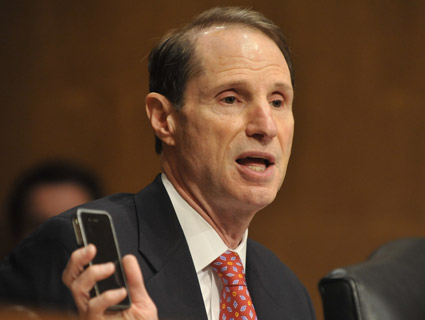
Sen. Ron Wyden (D-Ore.)Jay Mallin/ZUMAPRESS.com
A little more than two months ago, former National Security Agency contractor Edward Snowden revealed that the American government is collecting vast amounts of data on millions of citizens. Many were shocked by the leak, but Sen. Ron Wyden was among those who weren’t surprised by what Snowden had disclosed.
From his seat on the Senate Select Committee on Intelligence, the senior Democratic senator from Oregon has had an inside—yet classified—view of what America’s intelligence agencies are up to. He’s been pushing them for increased transparency, particularly on what information they are and aren’t collecting on law-abiding American citizens. During the debate over reauthorizing the Patriot Act in 2011, he warned, “When the American people find out how government has secretly interpreted the Patriot Act, they are going to be stunned and they are going to be angry.” (Wyden voted for the Patriot Act in 2001, but voted against its reauthorization in 2006.)
Though he’s been unable to disclose the specifics of the programs he’s criticizing, he says he’s still able to perform what he calls “vigorous oversight.” He made waves when he directly questioned Director of National Intelligence Gen. James Clapper about whether the government collects data on millions of Americans. Clapper denied that it did, only to be forced to later admit that he’d answered Wyden’s question in “the most truthful, or least untruthful, manner” he possibly could. He has forced the government to reveal that it has violated federal surveillance laws and engaged in unconstitutional spying and has said that the extent of those violations “are significantly more troubling than the government has stated.”
Wyden spoke to Mother Jones about his efforts to roll back the “always-expanding, omnipresent surveillance state,” why he’s hopeful for reform, and his thoughts about the Snowden leaks.
Mother Jones: Can you talk about what that’s been like for you to be one of the more prominent congressional critics of the lack of transparency and honesty from the National Security Agency and other American intelligence operations?
Sen. Ron Wyden: Well, it’s certainly been a challenge. Originally on the intelligence committee there were three of us that were strong advocates for privacy: Sen. [Russ] Feingold, Sen. [Richard] Durbin, and myself. And Sen. Feingold and Sen. Durbin left the committee and then I was kind of off on my own for a while. Now Sen. Mark Udall’s on the committee and doing a great job. Sen. [Martin] Heinrich has been very supportive and I think you saw particularly in the fight to secure documents with respect to the legal analysis for drones, we’re starting to get some new traction.
MJ: What is the Obama administration saying to you about your pushback on the NSA’s programs, if anything, behind closed doors?
RW: I think there’s been dramatic, dramatic progress made in the last eight weeks. If you had asked me eight weeks ago, “Would you have 26 United States senators—a quarter of the Senate—weighing in on these key issues with respect to civil liberties and to privacy? Would you have had the vote in the House, let alone gotten more than 200 votes?”, I would have said no way. And it’s my own kind of gut feeling now—and I’ve talked to the president about these issues several times over the last few months and I’m not basing this on any conversation with the president, I don’t get into what the president says to me—but I have have this gut feeling that the administration is beginning to rethink, particularly this program that I consider so, so violative of the privacy rights in particular, the bulk phone records collection. I believe they’re beginning to rethink this.
MJ: You say you have a feeling that the administration is beginning to rethink these programs, but then you have the White House and administration officials pushing for the defeat of the Amash amendment and vigorously defending the data collection programs in public. What gives?
RW: If you look at [the House vote], all across the political spectrum, there was very substantial support for our basic point, which is that if you’re out there collecting information so that you can figure out who was called and when they were called and where they were called, you basically are laying bare the personal lives of millions and millions of law-abiding Americans for bureaucrats and government contractors.
I think that we’re going to prevail. Part of what we’re trying to do is lay out what really happened. For example, I’ve been trying to get across that the intelligence leadership did not just keep the country in the dark. They actively misled the country on key issues. When you have someone who heads the NSA saying we don’t hold data at all on US citizens, that’s one of the most misleading statements I believe that’s ever been made about surveillance policy. And I think that now we’re starting to get that message across.
MJ: What, in your mind, is the difference between misleading and lying?
RW: Well, I’ll just characterize it that way and let your readers take those words and compare them to what has now been declassified: That you essentially have a human-relations database on millions of Americans. The administration said, “Well we’re not listening to calls, we don’t collect content.” As [Vice President] Joe Biden said when he was a United States senator, you don’t need to listen to those calls. If you have who somebody called, when and where, and you learned, for example, somebody called a psychiatrist three times in the last few days and twice after midnight, you know a lot about that person that they may not want people to know about them, especially the government.
MJ: You’ve said there are essentially two versions of the Patriot Act: The one the public can read and the way it’s interpreted behind closed doors. You’ve said this means the government can access a lot more than just phone call and email metadata. What do you mean?
RW: The government’s collection authority, under the Patriot Act, is basically limitless. They can get the medical records and financial records, gun purchase records. And it also becomes part of another important issue that relates to the FISA court and the rest of the debate. It almost becomes a secret law, like there are two Patriot Acts. The one you read on the laptop essentially leads you to believe that there’s some connection to terror and you read that and then you scratch your head and say, “How did they take that authority that’s described and use it to conjure up a legal rationale for collecting millions and millions of phone records on law-abiding people?”
MJ: What is it like to try and push transparency when you’re dealing with classified and top-secret information?
RW: As I put it, to paraphrase another: The ethics laws do not let us tap out the truth in Morse code.
MJ: What dangers to civil liberties and privacy do you see right now that the public is not yet aware of?
RW: I can’t talk about classified information, but what I try to do is describe what I think the bottom line is. You have an always-expanding, omnipresent surveillance state that’s constantly chipping away at the liberties and freedoms of law-abiding Americans. There’s an old saying: You really don’t miss your liberties until they’re gone. Particularly with cell phones. You have a computer in your pocket which can be used as a 24/7 tracking device. The position of the government is they have the authority to do the tracking. They say they aren’t, but they’re unambiguous about saying they have the authority to do it.
I tried to deliver the wake up call, the warning about the Patriot Act the last time it was reauthorized. Recently, I’ve offered up another warning: This is a unique time in our constitutional history. If we don’t use this special historical period to reform American surveillance laws and practices, I believe our generation is going to live to regret it. A surveillance state that is taking away liberties and freedoms that the Founding Fathers established and doing it all without actually making anybody safer.
MJ: One of the centerpieces of recent Patriot Act reform legislation is that it requires more of a demonstrated link to terrorism or espionage before the government may collect Americans’ personal information. What are the chances of this legislation getting through?
RW: Eight weeks ago you could not have seen the National Security Agency have to take down a fact sheet that Sen. Udall and I said was simply inaccurate, misleading. So we’re starting to put some points on the board for the cause of demonstrating that security and liberty are not mutually exclusive.
MJ: Could you talk a little about your approach to pushing for more transparency from your perch on the Senate intelligence committee?
RW: I’ve taken the view that I personally believe I can make the best contribution by complying with the rules and having the opportunity to try to be a watchdog inside the committee. For example, the questions I asked [Director of National Intelligence] Gen. [James] Clapper at the open hearing with respect to whether the government collects any data at all on millions or hundreds of millions of Americans, that was an example of an area where we felt strongly we were complying with the rules and doing vigorous oversight.
That stemmed from a situation where the head the National Security Agency said that they were not holding any data at all on millions of Americans. And I was very, very troubled by that and another statement that no dossiers were being kept, and we couldn’t get straight answers. So I sent Gen. Clapper the question in advance that I was going to ask. And in effect when you have a cleared official making a statement like that in public, that they don’t hold any data at all, I thought it was important to get the record straight.
MJ: Then he had to basically admit that he was not telling the truth.
RW: After the hearing, one of my staff went to a secure room and said that this was inaccurate and needed to be corrected. Gen. Clapper’s people said they knew it was inaccurate and they still wouldn’t correct it. At that point it never, or at least for quite some time, would never have been known. Then there were the [Snowden leaks] and Gen. Clapper started offering one answer after another with respect to why he did it.
The president said that to make all this work, you need to do vigorous oversight. In order to do vigorous oversight, the leadership of the intelligence community has got to be straight with the American people and straight with the Congress. For there to be vigorous oversight, the intelligence community’s got to be straight with the American people and the Congress and that has not been the case.
MJ: How do you think what Edward Snowden did has played into all of this, and what do you think of what he did?
RW: It’s been a long-standing position for me that when there is a criminal charge—and here you’re talking about espionage—I don’t get into making comments. What I will tell you is that I feel very strongly, very strongly, that this debate should have begun long, long ago by government officials, by members of Congress and the White House rather than by a contractor.
MJ: You said recently that the United States is drifting toward James Madison’s definition of tyranny.
RW: The combination of the growth of these digital technologies, the ability of the government to conjure up these secret interpretations, plus a very unusual and novel court make for this ever-expanding surveillance state. We so treasure our freedoms; we will regret it if our generation doesn’t use this unique time to reform the surveillance laws and make it clear that security and liberty are not mutually exclusive. We can do both.
















